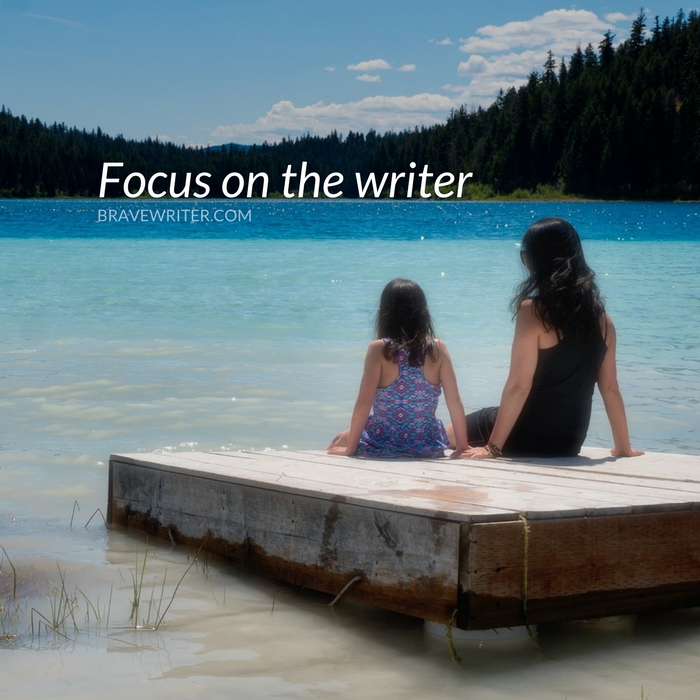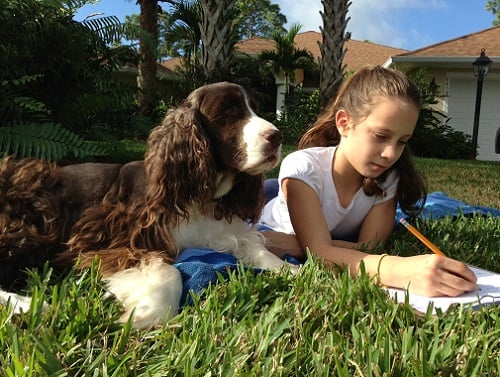We Teach Writers, not Writing

When asked to sum up the essence of Brave Writer, I like to start by looking at the company name: Brave Writer (not Brave Writing). That was a deliberate choice. Most companies describe themselves as “writing instruction.” Brave Writer could be described as “writer coaching.”
Our core value is to honor people: their voices, their insights, their unique learning styles, their real felt needs, their gifts and talents, their weaknesses and struggles. Writing is the result of unlocking words that lurk inside writers. As a result, we spend our energies in service of people:
- exploring their experience and process,
- explicating what is going on inside to help them connect to those words,
- and then getting the words to paper.
An analogy I like to use is the difference between reading a book that explains the nature of pregnancy (what is it biologically, what happens to your body and the baby’s, what are the stages of pregnancy, what are the signs of labor, how does birth happen, what kind of birthing options are available, and so on) and reading a book that helps you understand what you will go through as a pregnant person (how to manage cravings or signs of cramping, what sorts of exercises help prepare for natural childbirth, what emotions you’ll experience during each stage, possible ways to cure morning sickness or to relieve swollen ankles, how to handle gestational diabetes, what the body sensations are of swollen breasts and that inevitable “drop” right before labor…).
The first book may give you lots of information you want to know (and all of us want to know it!), but the second is designed to hold your hand as you walk through your pregnancy. In the first, you are left to interpret for yourself how to apply that information to your experience. In the second, someone is actually describing your experience and then sharing possible tactics for managing it and making it more pleasurable, tolerable and enjoyable.
Most writing manuals are like the first kind of pregnancy book. They tell you what a descriptive paragraph is, for instance, and what one must contain to fit the definition. Those manuals provide examples of other descriptive paragraphs; they may even give of list of elements to include. What they don’t do is describe in a process-oriented way what is going on inside of the writer while trying to access descriptive language.
Brave Writer is like the second kind of pregnancy book. Brave Writer materials and classes focus on the writer: “I want to write that descriptive paragraph and include those elements, but how do I find the clever or interesting words hiding inside of me? What do I do with my writer’s block? What happens when I churn out a lousy first draft – how do I revise it?”
Brave Writer provides you with a collection of
- experiences,
- techniques,
- and coaching insights derived from the writing lives of other writers,
- as well as investigative tools to help you and your kids dig deeper inside to catalyze writing.
In essence, our programs are labor coaches. We not only know what gestational stage your kids are in when they attempt to birth writing (some of them may still need to get pregnant and we can even help there!), we know how to coax those words forward so that once they make it to the page, we can go ahead and shape them up into something concrete like a descriptive paragraph or an essay. See the difference?
That’s why we say: We teach writers, not writing.




















Loved this article on the difference between teaching writing and coaching writers in the process of writing. I love your parallel to childbirth! Can you comment on Andrew Pudewa’s Excellence in Writing teachings, if you are familiar with the Institute for Excellence in Writing, as pertains to your philosphy presented in this article.
Thanks,
Cindy
I prefer not to tackle a specific curriculum (though I am quite familiar with IEW). But here is a link to another blog entry about the difference between BW and the other programs (IEW was definitely in mind as I wrote it):
Brave Writer v. the Other Programs
Julie, as you know, I’m up against IEW at my co op. I teach the Bravewriter way and my class has been referred to as the “creative writing” class. I tend to cringe when I hear this. I rather think of writing as learning how to express oneself. Right now, kids are creative beings full of wild imaginations so they freewrite in a descriptive way and hence, I walk them through the writing process to make their descriptive / creative writing better.
One mom made a comment today of why do kids need to learn to write creatively? She asked another mom if she ever writes creatively in her adult life — when would it ever be useful was the basic question.
I was busy at the time and not able to jump into the conversation. In some ways, I’m tired of defending Bravewriter as the co op is so prone towards this IEW approach to writing. (I do have several families sticking with me but it’s not the majority for sure.) To me, IEW takes an art and turns it into a science which is black and white and where all the pieces go in a certain place.
Can you tell me what your response would have been to this mom who questioned why kids should learn to write creatively? My gut reply would be to say they need to learn to write and revise and edit — whatever the topic. Right now at the 4th and 5th grade level, that turns out to be in a creative writing setting but in years to come the same principles will roll over into the academic writing that will be required.
Any thoughts appreciated!
Kellie
Kellie, change the language. Not creative writing, generative writing. All writing is creative (fiction, non-fiction, academic and personal). That’s because the writing is generated from within, created out of nothing, by the writer. Let them know, first of all, that academic writing is my personal strength! It’s what I do best. I have nothing but respect for the academic style of writing. Truth be told, though, none of them does academic writing as adults either! That period lasts for about eight years max (unless you go on to graduate school). Creating words to fit whatever format you need stays with you for your entire life. Learning formats does not teach anyone how to be a writer! It teaches writers how to prepare their words for a specific style of writing.
If you want to be equipped for all kinds of writing for the rest of your life, you must first learn how to access language from inside and know how to get those words out of you, onto the page. Then you must know what works for you in editing those words. Then you must know how to tailor the words to suit your audience. THIS is what creative writing is. This is what generative writing is. This is what it means to be a writer, not someone trained to jump through writing format hoops.
I hope that helps. 🙂
Julie
Thanks so much Julie!! This helps a great deal.